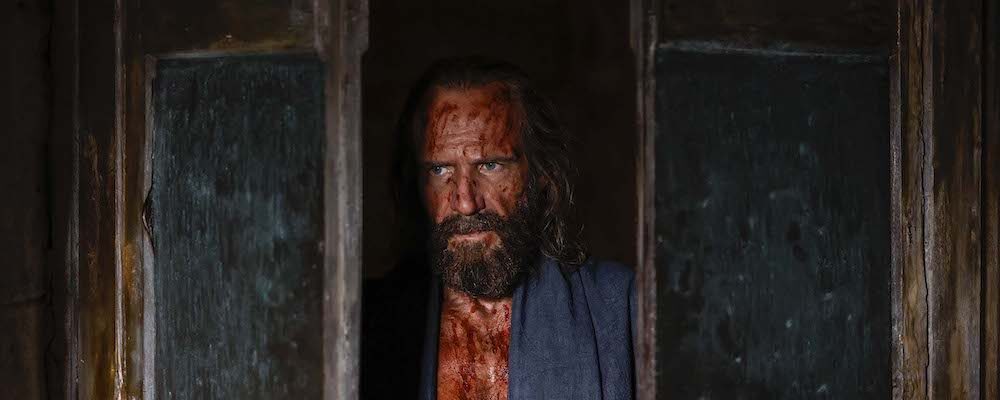‘The Return’ Reunites Ralph Fiennes and Juliette Binoche for a Stark Retelling of Homer’s Epic
Alci Rengifo
Uberto Pasolini’s “The Return” faithfully follows the final steps in Homer’s epic poem the “Odyssey.” Because we are used to knowing this story mainly as Greek myth, Pasolini’s stark approach feels more engaging than some over-the-top, special effects-heavy approach. What began as oral storytelling in the ancient world was, like mythology itself, an attempt by people to make sense of their world. You almost need screen veterans of the stature of Juliette Binoche and Ralph Fiennes to embody these roles, which are legendary, yet become grounded with these two titans. Pasolini then uses them to dig into the very implications of the tale.
As all students of the classics will recognize, the story begins with Odysseus (Fiennes) washing ashore his home island of Ithaca. He has been away 20 years, fighting in Troy, meant to return triumphant and instead marooned after insulting the god Poseidon. Now haggard and unrecognizable, Odysseus wanders back to his home castle to find it overtaken by a mob of suitors seeking the hand of his wife, Penelope (Binoche). They all know that whoever marries the presumed widow will become king of Ithaca. The suitors are also keen on eventually killing Odysseus’ grown but young son, Telemachus (Charlie Plummer). Odysseus begins to scope the place, inspiring derision from the suitors, while lamenting what has become of his home. Eventually, he will need to reveal his true self to his long-suffering wife and son.
There’s not much to spoil about how “The Return” progresses, unless you’ve never read anything about Homer or at least watched the enjoyable 1996 TV miniseries, “The Odyssey.” Pasolini doesn’t want to rewrite the classic. His aim is to see it with stark eyes and in that way, find powerful messages. The approach is similar to the great Greek director Michael Cacoyannis, who made striking adaptations of classic Greek plays and stories with eloquent grit. “The Return” in particular recalls Cacoyannis’ “The Trojan Women,” which features major stars like Katharine Hepburn and Vanessa Redgrave stripped of all glamor. Pasolini also puts together a notable cast here. This is Fiennes and Binoche reuniting 28 years after the Oscar-winning “The English Patient.” Ángela Molina, the classic Spanish actor who has worked with masters like Luis Buñuel and Pedro Almodóvar, is very moving as Eurycleia, Odysseus’ loyal housekeeper. She instantly recognizes scars from childhood on this frail stranger’s body.
If Homer’s “Iliad” is one of the great texts about war, “Odyssey” can be seen as about the aftershocks on a person, what today we call PTSD. Odysseus in “The Return” is not a headstrong mythical figure. Pasolini omits any gods or deities from this version. His portrait is of people scarred by a conflict far away that now seems senseless. In one of this film’s best scenes, Penelope finds the haggard stranger and asks if he fought in Troy and knew her husband. She’s perturbed by the need of men to fight and rape, asking if her husband pillaged and raped anyone. Fiennes evokes the pain of a soldier bringing baggage back home. No one is waiting to give him a hero’s welcome. Troy burned while life carried on sadly in Ithaca. Telemachus realizes who the old man is but doesn’t jump for joy. Instead, he carries much anger over being left alone, now watching a gang of usurpers storm his home.
It’s been common for a long time for Greek mythology to be mined for contemporary analogies. Simone Weil wrote about the “Iliad” as a way of making sense of Europe sliding into World War II. Lately, authors like Madeline Miller have given feminist angles to timeless stories. “The Return” does comment effectively on the patriarchal society at play. Penelope could easily run Ithaca herself, but social code demands she find a husband. None of the suitors are to her liking. Some are slavish pigs, others, like Antinous (Marwan Kenzari), are creepers. Most just want the money and power that comes with marrying the attractive widow. As in the original story, she tries to fend them off by weaving a burial shroud, claiming when finished she will choose a suitor but purposefully undoes her work at night.
The bloody climax of the story is done with yet another approach that brings out a more unnerving, effective angle. Odysseus eventually slaughtering the suitors isn’t envisioned by Pasolini as a stirring gesture for applause. Penelope is left in horror and Odysseus reveals the killer Troy turned him into. The invaders of this home surely deserved it. Was it necessary once the true king revealed himself? We are not supposed to ask such questions when watching past renditions, like the ’96 “The Odyssey” with a charismatic Armand Assante. Pasolini challenges us to question the violence of the tale, which can possibly lead to true allegories about the world we live in today. This is a rather austere film, shot by cinematographer Marius Panduru without much flash though his firelight compositions are memorable. The music by Rachel Portman calls little attention to itself. Its effect is in the faces of Fiennes and Binoche, who together embody those marked and heartbroken by war. Conflict is no myth.
“The Return” releases Dec. 6 in theaters nationwide.

